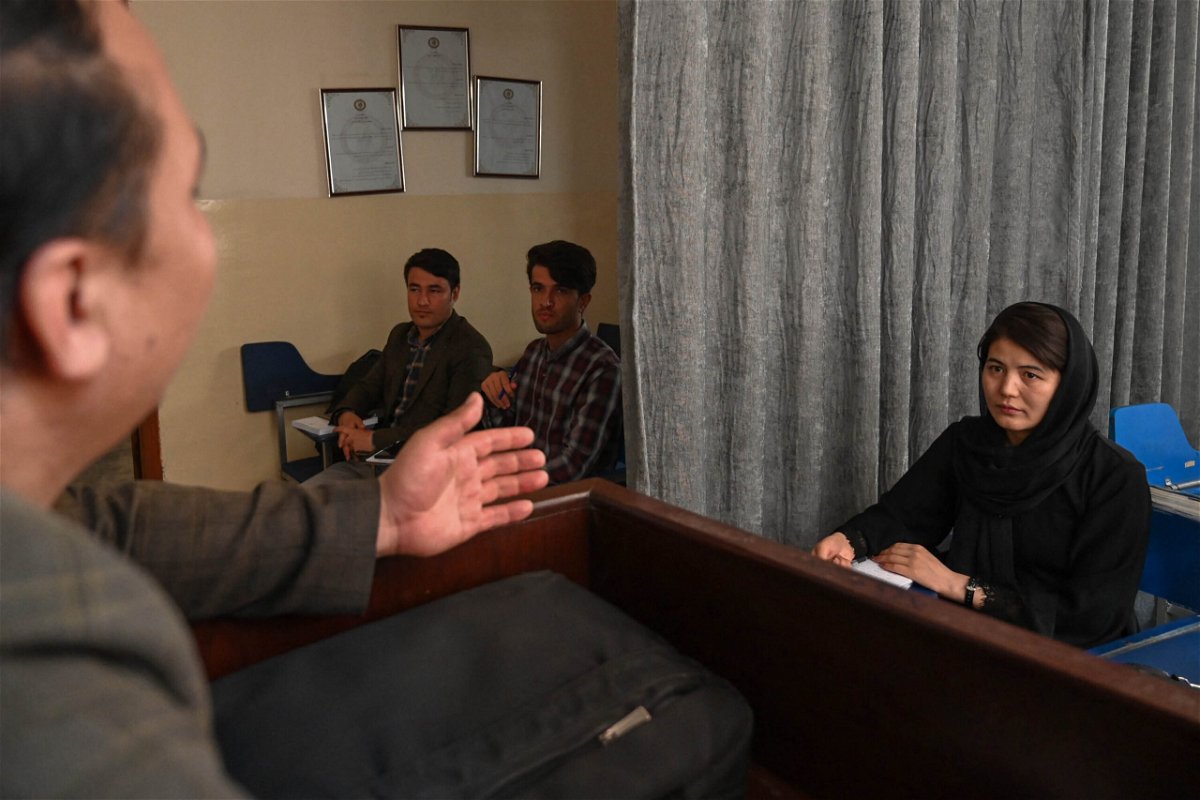Curtains separate male and female Afghan students as new term begins under Taliban rule

A teacher lectures students at a university in Afghanistan's capital on September 7.
By Tim Lister and Radina Gigova, CNN
A flimsy gray curtain divides a university classroom in Kabul in two — on one side sit the male students, on the other the female students, wearing hijabs.
It’s a glimpse into what education could look like in Afghanistan under Taliban rule, as some students returned to classrooms for the start of the new school semester this week.
The last time the Taliban were in power, from 1996 to 2001, women and girls were banned from education and work. After the militants were removed in 2001, women were free to go to university and jobs.
Now the Taliban are back. While their current leadership has insisted women will play a prominent role in society and that their regime will be “inclusive,” doubts remain over whether this rhetoric will match reality.
Photos shared on social media of the first university classrooms to open following the US withdrawal include women — but with striking differences.
The Taliban-run Ministry of Education has approved a proposal — submitted by Afghanistan’s union of universities, which represents 131 colleges — on the separation of male and female students.
According to the proposal, female and male students must enter their place of learning through separate entrances. Mixed classes are only allowed where the number of female students is fewer than 15, and the classroom must be divided by a curtain.
Newly-created classes at private universities should be separate for boys and girls, the proposal added. And all universities are obliged to designate a separate area for female students to perform their prayers.
In addition, “all female students, lecturers and employees are obliged to observe hijab according to Sharia,” the proposal said. The hijab covers the hair but not the face.
“In the future the universities should try to hire female professors for female students. In the meantime, efforts should be made to appoint elderly professors who are well-known for being trustworthy to teach female students,” the proposal continued.
Waheed Roshan, vice chancellor of the private Bakhtar University in Kabul, said the institution would comply with the proposal but added that for many colleges the logistics would be challenging.
He told CNN that Bakhtar — where about 20% of the 2,000 students are girls — could hold classes for boys and girls in separate shifts. But other colleges might struggle with putting partitions inside their classrooms, Roshan said.
‘Better to stay at home’
There was a mixed response from female students to the education changes. Sahar, 21, who is studying political science, told CNN she was happy that the Taliban had not banned girls from attending higher education, but described the new rules as extreme.
“There are so many female students in Kabul who grew up in a free environment where they had the opportunity to choose what to wear and which university to attend or whether to sit in a classroom with the boys or not, but now it would be too difficult for them to adapt to these extreme rules,” she said.
Sahar said that even before the Taliban took over, girls wore modest clothes and that she did not see the necessity for further restrictions. She also said she would try to resume her studies under the new rules, but wasn’t sure if she could continue for long.
Ziba, another student in her early 20s in Kabul, said that she was planning to abandon hopes of graduating from the university due to the security situation and because the Taliban might impose stricter conditions in the future. She said that it was better to stay at home.
Ziba asked CNN not to use her real name.
But Mina Qasem, 19, who graduated from high school last year, said that she was excited to start university. “I will put on any type of hijab they ask me to wear as long as they keep the universities open for the girls. I am so excited to start my next chapter of life and my sister who is going to finish high school this year will also apply for one of the private universities at the end of the year.”
Mina said that if girls wanted to have a voice in the future, they had to get educated whatever the circumstances.
The-CNN-Wire
™ & © 2021 Cable News Network, Inc., a WarnerMedia Company. All rights reserved.
A CNN contributor outside Afghanistan has not been named for safety reasons. CNN’s Sheena McKenzie contributed to this report.